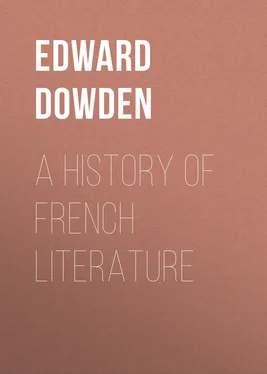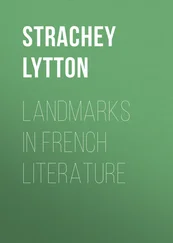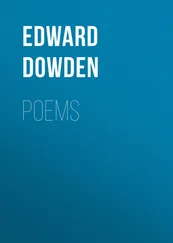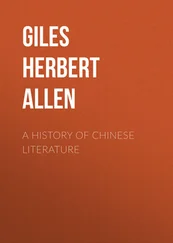Edward Dowden - A History of French Literature
Здесь есть возможность читать онлайн «Edward Dowden - A History of French Literature» — ознакомительный отрывок электронной книги совершенно бесплатно, а после прочтения отрывка купить полную версию. В некоторых случаях можно слушать аудио, скачать через торрент в формате fb2 и присутствует краткое содержание. Жанр: foreign_prose, foreign_home, Критика, Языкознание, foreign_antique, на английском языке. Описание произведения, (предисловие) а так же отзывы посетителей доступны на портале библиотеки ЛибКат.
- Название:A History of French Literature
- Автор:
- Жанр:
- Год:неизвестен
- ISBN:нет данных
- Рейтинг книги:3 / 5. Голосов: 1
-
Избранное:Добавить в избранное
- Отзывы:
-
Ваша оценка:
- 60
- 1
- 2
- 3
- 4
- 5
A History of French Literature: краткое содержание, описание и аннотация
Предлагаем к чтению аннотацию, описание, краткое содержание или предисловие (зависит от того, что написал сам автор книги «A History of French Literature»). Если вы не нашли необходимую информацию о книге — напишите в комментариях, мы постараемся отыскать её.
A History of French Literature — читать онлайн ознакомительный отрывок
Ниже представлен текст книги, разбитый по страницам. Система сохранения места последней прочитанной страницы, позволяет с удобством читать онлайн бесплатно книгу «A History of French Literature», без необходимости каждый раз заново искать на чём Вы остановились. Поставьте закладку, и сможете в любой момент перейти на страницу, на которой закончили чтение.
Интервал:
Закладка:
Edward Dowden
A History of French Literature / Short Histories of the Literatures of the World: II
PREFACE
French prose and French poetry had interested me during so many years that when Mr. Gosse invited me to write this book I knew that I was qualified in one particular—the love of my subject. Qualified in knowledge I was not, and could not be. No one can pretend to know the whole of a vast literature. He may have opened many books and turned many pages; he cannot have penetrated to the soul of all books from the Song of Roland to Toute la Lyre . Without reaching its spirit, to read a book is little more than to amuse the eye with printed type.
An adequate history of a great literature can be written only by collaboration. Professor Petit de Julleville, in the excellent Histoire de la Langue et de la Littérature Française , at present in process of publication, has his well-instructed specialist for each chapter. In this small volume I too, while constantly exercising my own judgment, have had my collaborators—the ablest and most learned students of French literature—who have written each a part of my book, while somehow it seems that I have written the whole. My collaborators are on my shelves. Without them I could not have accomplished my task; here I give them credit for their assistance. Some have written general histories of French literature; some have written histories of periods—the Middle Ages, the sixteenth, seventeenth, eighteenth, nineteenth centuries; some have studied special literary fields or forms—the novel, the drama, tragedy, comedy, lyrical poetry, history, philosophy; many have written monographs on great authors; many have written short critical studies of books or groups of books. I have accepted from each a gift. But my assistants needed to be controlled; they brought me twenty thousand pages, and that was too much. Some were accurate in statement of fact, but lacked ideas; some had ideas, but disregarded accuracy of statement; some unjustly depreciated the seventeenth century, some the eighteenth. For my purposes their work had to be rewritten; and so it happens that this book is mine as well as theirs.
The sketch of mediæval literature follows the arrangement of matter in the two large volumes of M. Petit de Julleville and his fellow-labourers, to whom and to the writings of M. Gaston Paris I am on almost every page indebted. Many matters in dispute have here to be briefly stated in one way; there is no space for discussion. Provençal literature does not appear in this volume. It is omitted from the History of M. Petit de Julleville and from that of M. Lanson. In truth, except as an influence, it forms no part of literature in the French language.
The reader who desires guidance in bibliography will find it at the close of each chapter of the History edited by M. Petit de Julleville, less fully in the notes to M. Lanson's History, and an excellent table of critical and biographical studies is appended to each volume of M. Lintilhac's Histoire de la Littérature Française . M. Lintilhac, however, omits many important English and German titles—among others, if I am not mistaken, those of Birsch-Hirschfeld's Geschichte der Französichen Litteratur: die Zeit der Renaissance , of Lotheissen's important Geschichte der Französichen Litteratur im XVII. Jahrhundert , and of Professor Flint's learned Philosophy of History (1893).
M. Lanson's work has been of great service in guiding me in the arrangement of my subjects, and in giving me courage to omit many names of the second or third rank which might be expected to appear in a history of French literature. In a volume like the present, selection is important, and I have erred more by inclusion than by exclusion. The limitation of space has made me desire to say no word that does not tend to bring out something essential or characteristic.
M. Lanson has ventured to trace French literature to the present moment. I have thought it wiser to close my survey with the decline of the romantic movement. With the rise of naturalism a new period opens. The literature of recent years is rather a subject for current criticism than for historical study.
I cannot say how often I have been indebted to the writings of M. Brunetière, M. Faguet, M. Larroumet, M. Paul Stapfer, and other living critics: to each of the volumes of Les Grands Écrivains Français , and to many of the volumes of the Classiques Populaires . M. Lintilhac's edition of Merlet's Études Littéraires has also often served me. But to name my aids to study would be to fill some pages.
While not unmindful of historical and social influences, I desire especially to fix my reader's attention on great individuals, their ideas, their feelings, and their art. The general history of ideas should, in the first instance, be discerned by the student of literature through his observation of individual minds.
That errors must occur where so many statements are made, I am aware from past experience; but I have taken no slight pains to attain accuracy. It must not be hastily assumed that dates here recorded are incorrect because they sometimes differ from those given in other books. For my errors I must myself bear the responsibility; but by the editorial care of Mr. Gosse, in reading the proof-sheets of this book, the number of such errors has been reduced.
EDWARD DOWDEN.DUBLIN, June 1897.
BOOK THE FIRST
THE MIDDLE AGES
CHAPTER I
NARRATIVE RELIGIOUS POETRY—THE NATIONAL EPIC—THE EPIC OF ANTIQUITY—ROMANCES OF LOVE AND COURTESY
The literature of the Middle Ages is an expression of the spirit of feudalism and of the genius of the Church. From the union of feudalism and Christianity arose the chivalric ideals, the new courtesy, the homage to woman. Abstract ideas, ethical, theological, and those of amorous metaphysics, were rendered through allegory into art. Against these high conceptions, and the overstrained sentiment connected with them, the positive intellect and the mocking temper of France reacted; a literature of satire arose. By degrees the bourgeois spirit encroached upon and overpowered the chivalric ideals. At length the mediæval conceptions were exhausted. Literature dwindled as its sources were impoverished; ingenuities and technical formalities replaced imagination. The minds of men were prepared to accept the new influences of the Renaissance and the Reformation.
I
NARRATIVE RELIGIOUS POETRY
The oldest monument of the French language is found in the Strasburg Oaths (842); the oldest French poem possessing literary merit is the Vie de Saint Alexis , of which a redaction belonging to the middle of the eleventh century survives. The passion of piety and the passion of combat, the religious and the warrior motives, found early expression in literature; from the first arose the Lives of Saints and other devout writings, from the second arose the chansons de geste . They grew side by side, and had a like manner of development. If one takes precedence of the other, it is only because by the chances of time Saint Alexis remains to us, and the forerunners of the Chanson de Roland are lost. With each species of poetry cantilènes —short lyrico-epic poems—preceded the narrative form. Both the profane and what may be called the religious chanson de geste were sung or recited by the same jongleurs—men of a class superior to the vulgar purveyors of amusement. Gradually the poems of both kinds expanded in length, and finally prose narrative took the place of verse.
The Lives of Saints are in the main founded on Latin originals; the names of their authors are commonly unknown.
Читать дальшеИнтервал:
Закладка:
Похожие книги на «A History of French Literature»
Представляем Вашему вниманию похожие книги на «A History of French Literature» списком для выбора. Мы отобрали схожую по названию и смыслу литературу в надежде предоставить читателям больше вариантов отыскать новые, интересные, ещё непрочитанные произведения.
Обсуждение, отзывы о книге «A History of French Literature» и просто собственные мнения читателей. Оставьте ваши комментарии, напишите, что Вы думаете о произведении, его смысле или главных героях. Укажите что конкретно понравилось, а что нет, и почему Вы так считаете.












